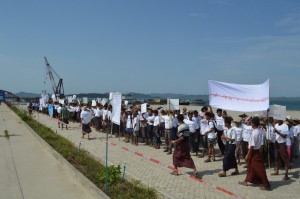Business and Human Rights (138 found)
ေပါင္းေလာင္းေဒသခံေကာ္မတီႏွင့္ ကယန္မ်ဳိးဆက္သစ္လူငယ္အဖြဲ႕၏ ပူးတြဲသတင္းထုတ္ျပန္ခ်က္
ရွမ္းျပည္နယ္ေတာင္ပုိင္း၊ ပ်ဥ္းမနားအေရွ႕ဘက္ ေပါင္းေလာင္းျမစ္ေပၚတြင္ တည္ေဆာက္ ထားေသာ အထက္ေပါင္းေလာင္ဆည္ေၾကာင့္ ျဖစ္ေပၚလာေသာ အက်ဳိးဆက္မ်ားသည္ ျပည္သူ လူထုႏွင့္ ႏုိင္ငံေတာ္ အေပၚမ်ားစြာ ထိခုိက္မႈရွိေနသျဖင့္ ေပါင္းေလာင္းေဒသခံေကာ္မတီ၀င္မ်ားႏွင့္ ကယန္မ်ဳိးဆက္သစ္ လူငယ္အဖြဲ႕မွ ျပင္းထန္စြာ […]
• • •Statement on Land and Natural Resource Management
The Karenni Civil Society Network (KCSN) organized a workshop on land and natural resource management on 18-20 October, 2013 at a location on the Thai-Karenni border. 48 participants from 16 local civil society groups attended the workshop and agreed to the following points […]
• • •HURFOM Releases “Disputed Territory” to Highlight Unjust Land Acquisition in Mon Areas
The Human Rights Foundation of Monland (HURFOM) has released a report titled “Disputed Territory: Mon farmers’ fight against unjust land acquisition and barriers to their progress,” to illustrate contemporary struggles against past and on-going land disputes. Drawing from almost 100 interviews conducted in Ye, Yebyu, and Kyaikmayaw townships, the report presents cases of land confiscation and abuse in Mon areas and elevates the voices of farmers who are actively pursuing justice […]
• • •Corporate Human Rights Abuses in ASEAN: Civil Society Calls for Corporate Accountability and Compliance with International Human Rights Law
Civil society groups called for greater corporate accountability in the region, which requires a regulatory framework based on international human rights norms and standards, to address the escalation of corporate human rights abuses in ASEAN, during the launch of a report, titled “Corporate Accountability in ASEAN: A Human Rights-Based Approach”, in Jakarta yesterday […]
• • •ND-Burma Report Documents On-Going Human Rights Abuse in Burma
The Network for Human Rights Documentation – Burma (ND-Burma) has released a periodic report documenting the human rights situation in Burma during the period of January – June 2013. The report documents 147 cases of human rights violations committed by the government and military throughout Burma […]
• • •A Dangerous Precedent for Development in Burma
 On 30 September, Shwe Gas Movement released a new report entitled, “Drawing The Line: The Case Against China’s Shwe Gas Project, For better Extractive Industries in Burma”. The report highlights the consequences, violations, unequal development, inadequate laws and the dangerous precedent set by the Shwe Gas Project. With increased investment and the liberalization of Burma’s economy, development projects similar to Shwe Gas are set to increase. If they follow a path of code and conduct similar to the Shwe Gas Project, the future of Burma will be rife with increased land confiscation, labor abuse, environmental degradation, loss of livelihoods, conflict, arrests and imprisonment of rights activists defending themselves and their communities. The benefits will be unequally distributed and negative consequences will be borne by farmers, fishermen, and by the citizens of Burma.
On 30 September, Shwe Gas Movement released a new report entitled, “Drawing The Line: The Case Against China’s Shwe Gas Project, For better Extractive Industries in Burma”. The report highlights the consequences, violations, unequal development, inadequate laws and the dangerous precedent set by the Shwe Gas Project. With increased investment and the liberalization of Burma’s economy, development projects similar to Shwe Gas are set to increase. If they follow a path of code and conduct similar to the Shwe Gas Project, the future of Burma will be rife with increased land confiscation, labor abuse, environmental degradation, loss of livelihoods, conflict, arrests and imprisonment of rights activists defending themselves and their communities. The benefits will be unequally distributed and negative consequences will be borne by farmers, fishermen, and by the citizens of Burma.
The Shwe Gas Project is the largest extractive resource project in Burma with dual gas and oil pipelines traveling almost 800km beginning in Arakan State, passing through Magway and Mandalay Regions, exiting Burma through northern Shan State and terminating in Kunming, China. The now operational project provides China with a valuable energy transportation system and is expected to earn US$54 billion for the Burma government, a government that was given the lowest resource governance ranking in the world three months ago by the Revenue Watch Institute […]
New Report: Shwe Gas Project Sets Dangerous Precedent
A new report released by Shwe Gas Movement calls for suspension of the Shwe Gas Project on the grounds that it sets a dangerous precedent for the extractive industries and leads to ongoing human rights abuses that include land confiscation, poor labor practices, environmental damage and exacerbation of tensions with ethnic nationalities […]
• • •Tavoyan Women Expose Abuses Linked to Dawei Deep Sea Port, Call for Project to be Suspended
A new video launched today by the Tavoyan Women’s Union (TWU) exposes how the Thai and Burmese developers of the Dawei deep sea port project are abusing local villagers’ rights. They are calling for an immediate suspension of the project.
The 15- minute video shows how the pristine beauty of the Tavoyan coast is being ravaged and the cultural heritage of the Tavoyan people being threatened by the port and industrial zone […]
• • •Letter to President Obama on GSP Trade Benefits for Burma
Dear President Obama,
We are writing about the ongoing review to reinstate trade benefits for Burma under the Generalized System of Preferences (GSP). Promoting trade with Burma creates human rights risks, particularly in problem sectors such as extractive industries and plantation agriculture, that could undermine the careful economic reengagement policy your Administration has charted thus far. Therefore, if GSP benefits are restored to Burma, we urge your Administration to take the steps outlined in this letter to manage the human rights impacts of that decision […]
• •Statement by Deputy National Security Advisor for Strategic Communications Ben Rhodes on the Expiration of the Ban on Imports from Burma
Today, in light of the July 28 expiration of the Burmese Freedom and Democracy Act’s (BFDA) ban on imports from Burma, the President issued an Executive Order that repeals the provisions of Executive Order 13310 that implemented the broad BFDA import ban on products of Burma […]
• • •








 All posts
All posts